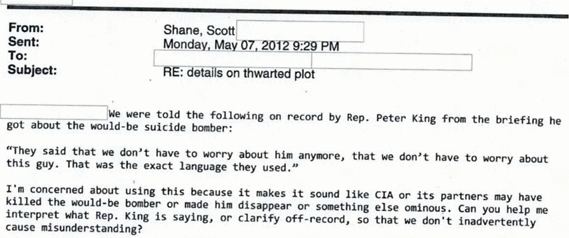On the Leak Crackdown: Donald Sachtleben Was a Convenient Scapegoat
I’m reading Charlie Savage’s Power Wars. While I disagree with some parts of it and have additional information that isn’t included in others (the book is already 700 pages, so it’s possible they were left out because of length), it is absolutely worth reading and provides a ton of insight about what Obama’s legal insiders were willing to share with Savage. Here’s a long interview with Glenn Greenwald about it.
As it happens, last year I wrote but never finalized a post on an area that is misleading in Savage’s chapter on the Obama Administration’s serial prosecution of leakers, about the prosecution of Donald Sachtleben, the retired FBI guy who, after being busted for kiddie porn, ultimately got prosecuted for being the leaker behind the AP’s UndieBomb 2.0 story. I’m tweaking it and posting it now. This post explains his bust.
Savage claims that Sachtleben never got IDed because he didn’t access any classified documents about the bomb and hadn’t signed the sign-in sheet of the room where it was being investigated — which is all stuff claimed in a Statement of Offense that is obviously designed to be misleading (though Sachtleben’s FBI badge did show him entering the examination space where the bomb was being examined; the Statement doesn’t say whether the specific room tracked badge entries). Savage states, Sachtleben “had visited the Quantico lab where the new underwear bomb was being examined on May 1, 2012, a few hours before Goldman and a colleague, Matt Apuzzo, first called government officials to say they knew the FBI had intercepted a new underwear bomb from Yemen” [that date of the call in the Statement is May 2]. That suggests (again, as the statement does) that Sachtleben was therefore the source for the things the AP told the government it knew on May 2.
As I’ve noted, Sacthleben contested this claim at his sentencing, which is actually consistent with what the text messages with him show: Goldman and Apuzzo were looking for confirmation of something they already knew.
“I was neither the sole nor the original source of information to ‘Reporter A’ about the suicide bomb,” Sachtleben said in a statement sent by his law firm. “The information I shared with Reporter A merely confirmed what he already believed to be true. Any implication that I was the direct source of a serious leak is an exaggeration.”
But in CIA Public Affairs emails obtained by FOIA by The Intercept last year, there’s further support for this. The emails reveal that by April 25, 2012 — 5 days before talking to Sachtleben — Goldman was already asking roughly the same questions about Ibrahim al-Asiri asked of Sachtleben. (PDF 548-9)
“We’re hearing about aqap activity that has USG spun up and Ibrahim al-asiri is back on agency’s radar.” None of that’s surprising, of course, since AP sourced the initial story to numerous officials, and it’s unlikely two Pulitzer Prize winners would single source a story.
The Statement misleadingly suggests that the when Goldman and Apuzzo called the government on May 2, two and a half hours after speaking with Sachtleben (and a full week after Goldman’s email to the CIA Public Affairs office), they stated for the first time that “they believed, but had not confirmed, that the bomb was linked to AQAP’s premier bomb-maker, Ibrahim al-Asiri.” Except the government knew, but did not reveal in the Statement, that the AP reporters had already reached out via official government channels a week earlier with some of that information. Contrary to what Savage suggests, the call on May 2 was not the “first” that government officials learned the AP was working on the story, though it may have been the first time they claimed to have confirmed details about the bomb.
The emails also show the extent of AP’s efforts to provide CIA an opportunity to weigh in on the story.
After several exchanges the week before (including a “chat” between Deputy CIA Director Mike Morell and an AP editor in which the AP agreed to hold the story), CIA’s press office set up a meeting between Goldman, Apuzzo, and Morell at 9:30 on the morning they released their story, May 7. An Apuzzo email describes the purpose. “[T]his meeting is just the one the DDCIA [Morell] suggested, to offer some details to the story we agreed to hold for a few days.” (PDF 308)
This confirms a point the AP long insisted on — that they heeded an administration request for a few days before they published the story. And in response, Apuzzo’s email makes clear, Morell had offered to provide further details on the plot. That of course means that Mike Morell was himself a source for the story, probably including for the detail that CIA had just drone-killed Fahd al-Quso. Last I checked, Morell is not in prison for leaking to the AP (though of course his influence on the story would be considered official declassification and therefore cool).
Apuzzo followed up on the meeting and the story later that day. “I know that there were some strained conversations between our bosses this evening, but as far as Adam and I are concerned, I hope you found the story fair, accurate and responsible.” (PDF 308)
Of course, CIA had no reason to be pissed, given that the AP story celebrated their successful interception of a plot. Indeed, there is a very high likelihood that the CIA talked the AP reporters out of including more sensitive details — such as that the plot was really a sting run by a Saudi asset — that detail came out in other outlets, thanks in part to John Brennan and Peter King (the latter of whom was in turn blabbing about something the CIA had just briefed him), within a day. Or, something implied by the story but not stated directly, that the Administration had deployed a bunch of Air Marshals to Europe to protect against a threat that had never really been a threat and that they had already neutralized anyway. Those are the damning details of the story, but they weren’t in the AP’s version of it.
But the government came after them anyway. And, after members of Congress — including Peter King, who had served as a source for journalists!! — demanded a head, Donald Sachtleben served as a convenient one to offer up.
The story the government has told about Sachtleben — that they found he had a Secret CIA cable among his kiddie porn but didn’t pursue it any further until they exposed the sources of the entire AP newsroom — has never made sense. But as a guy who had already confessed to kiddie porn charges and had actually only served as the confirming source for some of the least sensitive information in the leak, he was convenient.
And while Savage appropriately lays into the Administration for the damage they did to journalism with their pursuit of leakers, the back story behind the scapegoating of Sachtleben suggests DOJ has been far more cynical about leaks and who gets prosecuted for them than suggested in Savage’s chapter.


